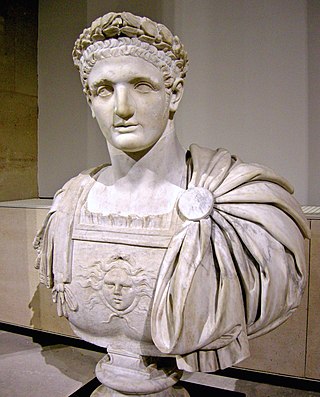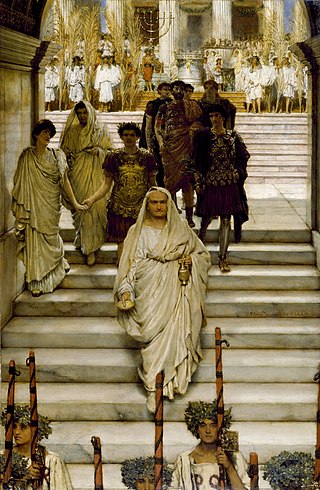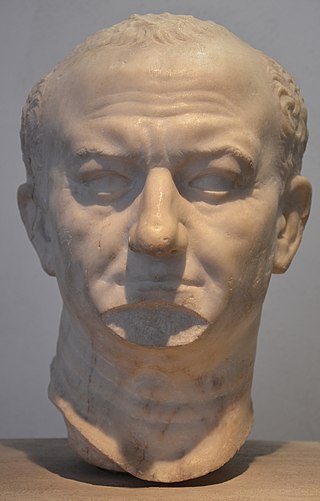Related Research Articles

Domitian was Roman emperor from 81 to 96. The son of Vespasian and the younger brother of Titus, his two predecessors on the throne, he was the last member of the Flavian dynasty. Described as "a ruthless but efficient autocrat", his authoritarian style of ruling put him at sharp odds with the Senate, whose powers he drastically curtailed.

Vespasian was Roman emperor from 69 to 79. The fourth and last emperor who reigned in the Year of the Four Emperors, he founded the Flavian dynasty that ruled the Empire for 27 years. His fiscal reforms and consolidation of the empire generated political stability and a vast Roman building program.

The 80s was a decade that ran from January 1, AD 80, to December 31, AD 89.

The 90s was a decade that ran from January 1, AD 90, to December 31, AD 99.
AD 84 (LXXXIV) was a leap year starting on Thursday of the Julian calendar. In the Roman Empire, it was known as the Year of the Consulship of Augustus and Sabinus. The denomination AD 84 for this year has been used since the early medieval period, when the Anno Domini calendar era became the prevalent method in Europe for naming years.

Titus Caesar Vespasianus was Roman emperor from 79 to 81. A member of the Flavian dynasty, Titus succeeded his father Vespasian upon his death.
Titus Flavius may refer to

The Flavian dynasty ruled the Roman Empire between AD 69 and 96, encompassing the reigns of Vespasian (69–79), and his two sons Titus (79–81) and Domitian (81–96). The Flavians rose to power during the civil war of 69, known as the Year of the Four Emperors. After Galba and Otho died in quick succession, Vitellius became emperor in mid 69. His claim to the throne was quickly challenged by legions stationed in the Eastern provinces, who declared their commander Vespasian emperor in his place. The Second Battle of Bedriacum tilted the balance decisively in favour of the Flavian forces, who entered Rome on 20 December. The following day, the Roman Senate officially declared Vespasian emperor of the Roman Empire, thus commencing the Flavian dynasty. Although the dynasty proved to be short-lived, several significant historic, economic and military events took place during their reign.

The gens Flavia was a plebeian family at ancient Rome. Its members are first mentioned during the last three centuries of the Republic. The first of the Flavii to achieve prominence was Marcus Flavius, tribune of the plebs in 327 and 323 BC; however, no Flavius attained the consulship until Gaius Flavius Fimbria in 104 BC. The gens became illustrious during the first century AD, when the family of the Flavii Sabini claimed the imperial dignity.

Julia Flavia or Flavia Julia and also nicknamed Julia Titi was the daughter of Roman Emperor Titus and his first wife Arrecina Tertulla.
Titus Flavius Sabinus was the name of several notable Ancient Romans, including:
Titus Flavius Clemens may refer to:

Vespasia Polla was the mother of the Roman emperor Vespasian, and grandmother to the emperors Titus and Domitian. Polla came from an equestrian family at Nursia.
Titus Flavius T. f. T. n. Clemens was a Roman politician and cousin of the emperor Domitian, with whom he served as consul from January to April in AD 95. Shortly after leaving the consulship, Clemens was executed, allegedly for atheism, although the exact circumstances remain unclear. Over time, he came to be regarded as an early Christian martyr.
Flavia Domitilla was a Roman noblewoman of the 1st century AD. She was a granddaughter of Emperor Vespasian and a niece of Emperors Titus and Domitian. She married her second cousin, the consul Titus Flavius Clemens, a grand-nephew of Vespasian through his father Titus Flavius Sabinus.
Titus Flavius T. f. T. n. Sabinus was a Roman politician and soldier. A native of Reate, he was the elder son of Titus Flavius Sabinus and Vespasia Polla, and brother of the Emperor Vespasian.
Titus Flavius Sabinus was a Roman senator who was active in the first century AD. He was twice consul suffectus, first in the nundinium of April through June of 69 with his brother Gnaeus Arulenus Caelius Sabinus, and again in May and June of 72 as the colleague of Gaius Licinius Mucianus.

Arrecina Tertulla was a Roman woman who lived in the 1st century. She was the first wife of Titus and mother of his daughter Julia Flavia.

The gens Annia was a plebeian family at ancient Rome. Livy mentions a Lucius Annius, praetor of the Roman colony of Setia, in 340 BC, and other Annii are mentioned at Rome during this period. Members of this gens held various positions of authority from the time of the Second Punic War, and Titus Annius Luscus attained the consulship in 153 BC. In the second century AD, the Annii gained the Empire itself; Marcus Aurelius was descended from this family.
Gnaeus Arulenus Caelius Sabinus was a Roman senator, who was active during the Year of Four Emperors. He was suffect consul in the nundinium of April through June of 69 AD as the colleague of his brother Titus Flavius Sabinus.
References
- ↑ Gavin Townend, "Some Flavian Connections", Journal of Roman Studies , 51 (1961), pp. 55-57
- ↑ Paul Gallivan, "The Fasti for A. D. 70-96", Classical Quarterly , 31 (1981), pp. 190, 215